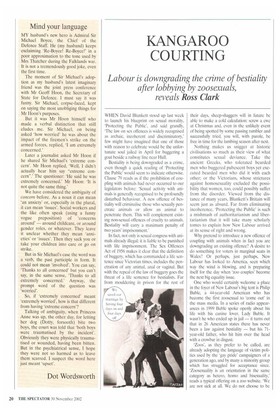Mind your language
MY husband's new hero is Admiral Sir Michael Boyce, the Chief of the Defence Staff. He (my husband) keeps exclaiming 'Re-Boyce! Re-Boyce!' in a poor approximation to the tone used by Mrs Thatcher during the Falklands war. It is not a tremendously good joke, even the first time.
The moment of Sir Michael's adoption as my husband's latest imaginary friend was the joint press conference with Mr Geoff Hoon, the Secretary of State for Defence. I must say it was funny. Sir Michael, corpse-faced, kept on saying the most unobliging things for Mr Hoon's purposes.
But it was Mr Hoon himself who made a verbal distinction that still eludes me. Sir Michael, on being asked 'how worried' he was about the impact of the firemen's strike on the armed forces, replied, am extremely concerned.'
Later a journalist asked Mr Hoon if he shared Sir Michael's 'extreme concern'. Mr Hoon replied, 'Well, I didn't actually hear him say "extreme concern".' The questioner: 'He said he was extremely concerned.' Mr Hoon: 'It is not quite the same thing.'
We have considered the ambiguity of concern before. As a noun it can mean 'an anxiety' or, especially in the plural, it can mean 'issues'. Social workers and the like often speak (using a funny vogue preposition) of 'concerns around' — around childcare, or around gender roles, or whatever. They leave it unclear whether they mean 'anxieties' or 'issues'. Then they sack you or take your children into care or go on strike.
But in Sir Michael's case the word was a verb, the past participle in form. It could not mean 'involved'. You can say, 'Thanks to all concerned' but you can't say, in the same sense, 'Thanks to all extremely concerned.' Anyway, the prompt word of the question was 'worried'.
So, if 'extremely concerned' meant 'extremely worried', how is that different from having 'extreme concern'?
Talking of ambiguity, when Princess Anne was up, the other day, for letting her dog (Dotty, forsooth) bite two boys, the court was told that 'both boys were traumatised by the incident'. Obviously they were physically traumatised or wounded, having been bitten. But in the psychiatrical sense, I hope they were not so harmed as to leave them scarred. I suspect the word here just meant 'upset'.


























































































 Previous page
Previous page